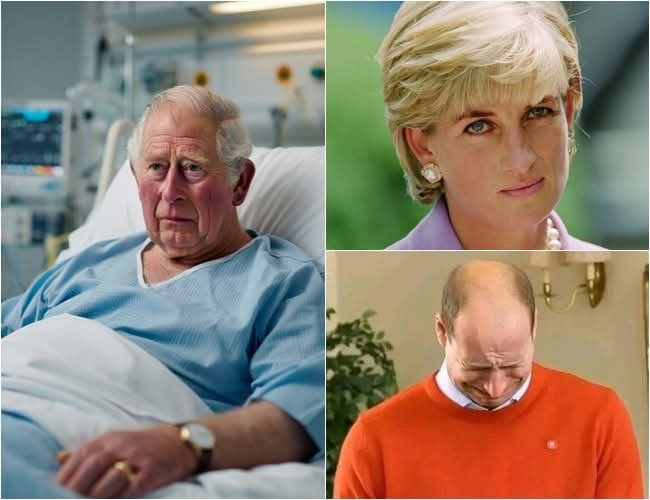NEWS
A KING’S REGRET: A Final Confession to His Son :Lying in the hospital at the end of his life, King Charles finally dared to confess to William the truth many feared: “I’m sorry, son. I took your mother away, just because…”

A KING’S REGRET: A Final Confession to His Son :Lying in the hospital at the end of his life, King Charles finally dared to confess to William the truth many feared: “I’m sorry, son. I took your mother away, just because…”
In the final moments of a monarch’s life, when the world seems to shrink to the walls of a hospital room, a royal legacy weighs heavy on the heart. King Charles, lying weakly in his bed, had long been a figure of power, a man who had shaped not only the future of a nation but also the hearts of his family. Yet, at the end of his reign, as death beckoned, there was one truth he had carried with him, a burden so great that it had remained buried for decades. With his body failing and his time running out, he knew that the moment had come for confession, for redemption, and for healing.
King Charles, now an older man, had lived a life steeped in privilege and duty. His every move scrutinized, every decision weighed by the immense responsibility of the crown. But despite his accomplishments and the adoration of millions, his private life had been marred by a profound sorrow—a regret he had never shared. This secret, buried deep within him, had affected the most precious bond in his life: the one he shared with his son, Prince William.
The story, as it had been passed through the halls of history, was well-known. The tragic and untimely death of Princess Diana, William’s mother, had stunned the world. A woman loved by millions, a figure of compassion and grace, gone in a flash of tragedy. For years, the circumstances surrounding her death, and her tumultuous relationship with the royal family, had been subject to speculation. But no one knew the true weight of the guilt Charles had carried.
On the eve of his passing, as the royal family gathered by his side, King Charles mustered the strength to speak to his son. With his breath shallow and his voice frail, he finally dared to utter the words that had remained locked within him for so long. “I’m sorry, son. I took your mother away, just because…” The silence that followed was deafening, heavy with the emotional weight of years of pain, confusion, and unspoken truths.
What followed, in those fleeting moments before Charles succumbed to the inevitable, was an attempt to offer William something no one else could. Understanding. After all, the heir to the throne had grown up with a different kind of grief, one shaped by public scrutiny, one where the world had watched as his family fractured. William had, over the years, forged his own path, attempting to reconcile with the shadows of his past while fulfilling the expectations placed upon him. Yet, despite all his efforts, a part of him had never fully understood the man his father had become—until that moment.
For many, the confession might have seemed like a final bid for absolution. But for William, it was a moment of painful revelation. In those few words, his father had inadvertently shared the deepest wound of his own soul—the heartbreak of a decision made long ago, a decision that had cost the royal family not just their peace, but the future of a young boy who would one day inherit the world.
The king’s admission was a recognition of the painful truth he had denied for so many years: his actions had contributed to the destruction of his marriage and, by extension, the loss of Diana. The world had seen the public dissolution of a fairytale marriage, but few knew the extent of the internal turmoil that plagued Charles in the aftermath of his choices. His confession was an acknowledgement of his flaws, a recognition of the toll it had taken on his son, and an attempt to right a wrong that had haunted him for decades.
As the room fell silent, with only the sound of Charles’s labored breathing filling the space, William, his heart heavy with emotion, found himself at a crossroads. This was the moment he had always longed for—an understanding, an answer to the many questions he had kept buried inside. Yet, the truth was bittersweet. The king’s apology did not change the past, nor could it undo the pain that had shaped his life. But it did offer a sense of closure, a kind of peace that William had never thought possible.
The tragic irony of this moment lay in the fact that the king’s confession came too late. Much of what was said in those final moments could never undo the years of turmoil, grief, and heartbreak that had marked their family. But, in those final words, Charles had offered his son something invaluable: a glimpse into the heart of a man who, despite his failings, had tried, in his own way, to protect and love his family.
As King Charles passed away shortly after his confession, the weight of the monarchy continued to press down on William, now a king in his own right. The world would move on, as it always did, but for a fleeting moment, a father and son had bridged the gap that had separated them for so long. Though the past could never be undone, the acknowledgment of a mistake, and the desire to make amends, would live on in the hearts of those who had witnessed this final, raw moment of truth.











